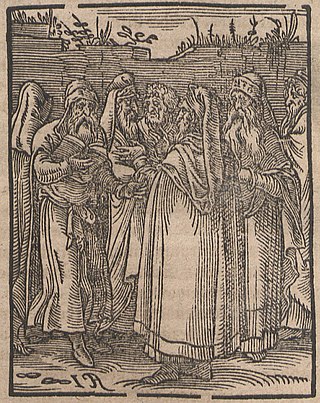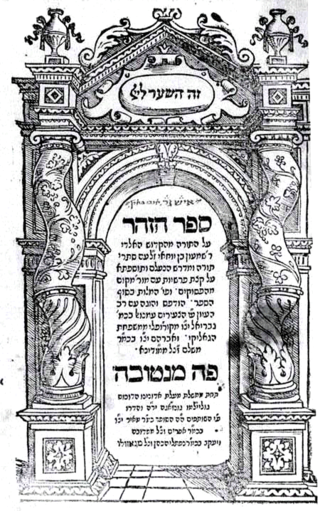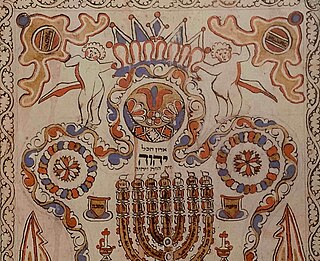
Kabbalah or Qabalah is an esoteric method, discipline and school of thought in Jewish mysticism. A traditional Kabbalist is called a Mekubbal. The definition of Kabbalah varies according to the tradition and aims of those following it, from its origin in medieval Judaism to its later adaptations in Western esotericism. Jewish Kabbalah is a set of esoteric teachings meant to explain the relationship between the unchanging, eternal God—the mysterious Ein Sof —and the mortal, finite universe. It forms the foundation of mystical religious interpretations within Judaism.

The Zohar is a foundational work of Kabbalistic literature. It is a group of books including commentary on the mystical aspects of the Torah and scriptural interpretations as well as material on mysticism, mythical cosmogony, and mystical psychology. The Zohar contains discussions of the nature of God, the origin and structure of the universe, the nature of souls, redemption, the relationship of ego to darkness and "true self" to "the light of God".

Isaac ben Solomon Luria Ashkenazi, commonly known in Jewish religious circles as Ha'ari, Ha'ari Hakadosh or Arizal, was a leading rabbi and Jewish mystic in the community of Safed in the Galilee region of Ottoman Syria, now Israel. He is considered the father of contemporary Kabbalah, his teachings being referred to as Lurianic Kabbalah.
In the Zohar, Lurianic Kabbalah, and Hermetic Qabalah, the qlippoth, are the representation of evil or impure spiritual forces in Jewish mysticism, the opposites of the Sefirot. The realm of evil is called Sitra Achra in Kabbalistic texts.
Academic study of Jewish mysticism, especially since Gershom Scholem's Major Trends in Jewish Mysticism (1941), draws distinctions between different forms of mysticism which were practiced in different eras of Jewish history. Of these, Kabbalah, which emerged in 12th-century southwestern Europe, is the most well known, but it is not the only typological form, nor was it the first form which emerged. Among the previous forms were Merkabah mysticism, and Ashkenazi Hasidim around the time of the emergence of Kabbalah.

Keter or Kether is the first of the ten sefirot in the Kabbalistic Tree of Life, symbolizing the divine will and the initial impulse towards creation from the Ein Sof, or infinite source. It represents pure consciousness and transcends human understanding, often referred to as "Nothing" or the "Hidden Light". Keter is associated with the divine name "Ehyeh Asher Ehyeh", meaning "I Am that I Am", which was revealed to Moses from the burning bush, and it embodies the qualities of absolute compassion and humility. Its meaning is "crown", and it is interpreted as both the "topmost" of the Sefirot and the "regal crown" thereof.

Moses ben Jacob Cordovero was a central figure in the historical development of Kabbalah, leader of a mystical school in 16th-century Safed, Ottoman Syria. He is known by the acronym the Ramak.

Sefirot, meaning emanations, are the 10 attributes/emanations in Kabbalah, through which Ein Sof reveals itself and continuously creates both the physical realm and the seder hishtalshelut. The term is alternatively transliterated into English as sephirot/sephiroth, singular sefira/sephirah.
Ein Sof, or Eyn Sof, in Kabbalah, is understood as God prior to any self-manifestation in the production of any spiritual realm, probably derived from Solomon ibn Gabirol's term, "the Endless One". Ein Sof may be translated as "unending", "(there is) no end", or infinity. It was first used by Azriel, who, sharing the Neoplatonic belief that God can have no desire, thought, word, or action, emphasized by it the negation of any attribute. Of the Ein Sof, nothing ("Ein") can be grasped ("Sof"-limitation). It is the origin of the Ohr Ein Sof, the "Infinite Light" of paradoxical divine self-knowledge, nullified within the Ein Sof prior to creation. In Lurianic Kabbalah, the first act of creation, the Tzimtzum self "withdrawal" of God to create an "empty space", takes place from there. In Hasidic Judaism, the Tzimtzum is only the illusionary concealment of the Ohr Ein Sof, giving rise to monistic panentheism. Consequently, Hasidism focuses on the Atzmus divine essence, rooted higher within the Godhead than the Ein Sof, which is limited to infinitude, and reflected in the essence (etzem) of the Torah and the soul.

Chokmah is the Biblical Hebrew word rendered as "wisdom" in English Bible versions. It is the second of the ten sefirot in Kabbalah, and represents the first power of conscious intellect and subtle manifestation, emerging from Keter's pure potentiality. It embodies wisdom coming from nothingness, as highlighted in the Book of Job and the Bahir. Chokmah is the primordial point of divine wisdom that becomes comprehensible through Binah.

Samuel David Luzzatto, also known by the Hebrew acronym Shadal, was an Italian-Austrian Jewish scholar, poet, and a member of the Wissenschaft des Judentums movement.

Yeshivah College, officially Yeshivas Oholei Yosef Yitzchok Lubavitch, is an independent Orthodox Jewish comprehensive single-sex primary and secondary Jewish day school for boys, located in the Melbourne suburb of St Kilda East, in Victoria, Australia.
Dovber Schneuri was the second Rebbe of the Chabad Lubavitch Chasidic movement. Rabbi Dovber was the first Chabad rebbe to live in the town of Lyubavichi, the town for which this Hasidic dynasty is named. He is also known as the Mitteler Rebbe, being the second of the first three generations of Chabad leaders.

Harry Oskar Triguboff is a Chinese-born Australian billionaire real estate developer, and one of Australia's richest people. He is the founder and managing director of Meriton and is known as "high-rise Harry".
Tikunei haZohar, also known as the Tikunim (תקונים), is a main text of the Kabbalah that was composed in the 14th century. It is a separate appendix to the Zohar, a crucial 13th-century work of Kabbalah, consisting of seventy commentaries on the opening word of the Torah, In the beginning, in the Midrashic style. The theme of Tikunei haZohar is to repair and support the Shekhinah or Malkuth — hence its name, "Repairs of the Zohar" — and to bring on the Redemption and conclude the Exile.
Daniel Chanan Matt is an author, teacher and scholar of Kabbalah. He received his Ph.D. from Brandeis University and served as a professor at the Graduate Theological Union in Berkeley from 1979-2000. He has also taught at Stanford University and the Hebrew University of Jerusalem. Matt is best known for his multi-volume annotated translation, The Zohar: Pritzker Edition. He composed the first nine volumes of this twelve-volume series, and was the General Editor of the remaining three volumes. His annotated translation has been hailed as "a monumental contribution to the history of Jewish thought." He currently teaches Zohar online.

Boaz Huss is a professor of Kabbalah at the Goldstein-Goren Department of Jewish Thought at Ben-Gurion University of the Negev. He is a leading scholar in contemporary Kabbalah.
Z'ev ben Shimon Halevi was an author of books on the Toledano Tradition of Kabbalah, a teacher of the discipline, with a worldwide following, and a founding member of the Kabbalah Society.

Yehuda Liebes is an Israeli academic and scholar. He is the Gershom Scholem Professor Emeritus of Kabbalah at the Hebrew University of Jerusalem. Considered a leading scholar of Kabbalah, his research interests also include Jewish myth, Sabbateanism, and the links between Judaism and ancient Greek religion, Christianity, and Islam. He is the recipient of the 1997 Bialik Prize, the 1999 Gershom Scholem Prize for Kabbalah Research, the 2006 EMET Prize for Art, Science and Culture, and the 2017 Israel Prize in Jewish thought.











